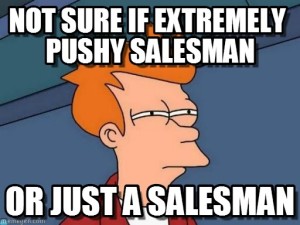Thus far in class, we’ve been contrasting the old version of sales:
With the new version of sales:
(that’s supposed to be empathy, by the way)
But what if I told you that there’s an even newer method of selling that is starting to
revolutionize the way corporations advertise? And what if I told you they did so by  manipulating your mind?
manipulating your mind?
I’m not kidding. In UK organization PRISM Brain Mapping’s report “Selling with Neuroscience,” the researchers write that “Neuroscience works by giving you an invaluable insight into the brain’s processing patterns, which can influence sales strategies in any given situation.” They claim that 95% of the decisions people make are made by the subconscious mind and thus all selling is a brain-to-brain process.
Advertisers and salespeople are using brain imaging technology to literally decipher what goes on in consumers’ heads. “The neuro-selling theory is that if we can capture and understand the emotions of the people that are buying a product, then our advertising is going to be far more  effective.” But is this just way to wild to actually be true? Honda would say no.
effective.” But is this just way to wild to actually be true? Honda would say no.
In an effort to boost sales and touch up their image, Honda used some of the most cutting-edge tech in brain science to monitor the emotions of buyers who visited their car dealerships. After logging data points on their heart rate, respiration, and muscle contraction, analysts combed through the data to find common triggers for sales. But is this for real?
Yes – in fact, “Honda found the results so persuasive that it is remodeling showrooms and retraining staff to tailor pitches according to a potential buyer’s state of mind.” Manager of Customer Communications for Honda UK, Ian Armstrong stated that: “Conventional research only gets you so far because it’s rationalization after the event, and most decision-making is done subconsciously. We set out to measure physical changes people cannot consciously
control.”
 Okay so that’s great for huge corporations who can spend hundreds of thousands of dollars on brain-scanning equipment and data analysts. But what about us – small-business entrepreneurs? This article also mentioned some tactics that salesmen themselves can use that are proven to work at the neural level.
Okay so that’s great for huge corporations who can spend hundreds of thousands of dollars on brain-scanning equipment and data analysts. But what about us – small-business entrepreneurs? This article also mentioned some tactics that salesmen themselves can use that are proven to work at the neural level.
Firstly, when approaching a prospect the salesman needs to avoid alarming the prospect’s ‘threat detector.’ To counter a flight/fight response, the researchers recommend that salesmen “must focus on the customer to identify his or her behavioral preferences so that all our subsequent communication matches his or her behavioral needs.”
But how should a salesman judge whether he is successfully communicating? Emotions. Why? “In essence, people make emotional decisions which they then try to rationalize. To influence  buying decisions, successful salespeople need to be able to activate the appropriate areas of the customer’s brain.”
buying decisions, successful salespeople need to be able to activate the appropriate areas of the customer’s brain.”
A basic tenant of neuroscience teaches that when we become consciously aware of something, the synapses between neurons are strengthened – and the more times we become aware of it, the bigger the neuronal networks are that are stimulated. Basically, these networks motivate us towards or away from something because we know how that interaction will affect us. As the writers comment, “the mind-altering power of advertising has been demonstrated in a  remarkable study of the way in which brand recognition affects the workings of the human brain. Values associated with particular brands can be so powerful that they have the ability to physically alter consumers’ brains and thus change their perceptions of a product.”
remarkable study of the way in which brand recognition affects the workings of the human brain. Values associated with particular brands can be so powerful that they have the ability to physically alter consumers’ brains and thus change their perceptions of a product.”
The researchers did the simple Coke-Pepsi taste game to prove this theory – and of course, the results showed no real preference for one brand over another when the taste was blind. But when consumers knew they were drinking Coke, their brain scans showed a huge increase in stimulation in areas of the brain associated with cultural knowledge, memory, and self-image. Freaky.
Mind-reading could be the future of successfully marketing… does that scare you? Or is it just me?


Really interesting stuff, Karolina. It’s sort of scary to think how manipulative sales can be. Though I guess in some ways, if companies read our minds well, knowing what WE want rather than what THEY want to sell us, the end result might actually be beneficial.
Crazy stuff. Feels like a cold form of empathy. Something about it offends my humanity. Something about it makes me check my ethics. On the same note, how cool that we can break sales down into a science! I’ll be interested to see where this goes. Thanks for sharing.
http://i.imgur.com/HcmTOc7.png
I fully welcome advertising that is tailored to me, because I like seeing interesting advertising that applies to me better than seeing advertising that is boring! This reminds me of the Tom Cruise movie “Minority Report,” where mall advertisements are personalized to each person by scanning their eyes as they walk by.